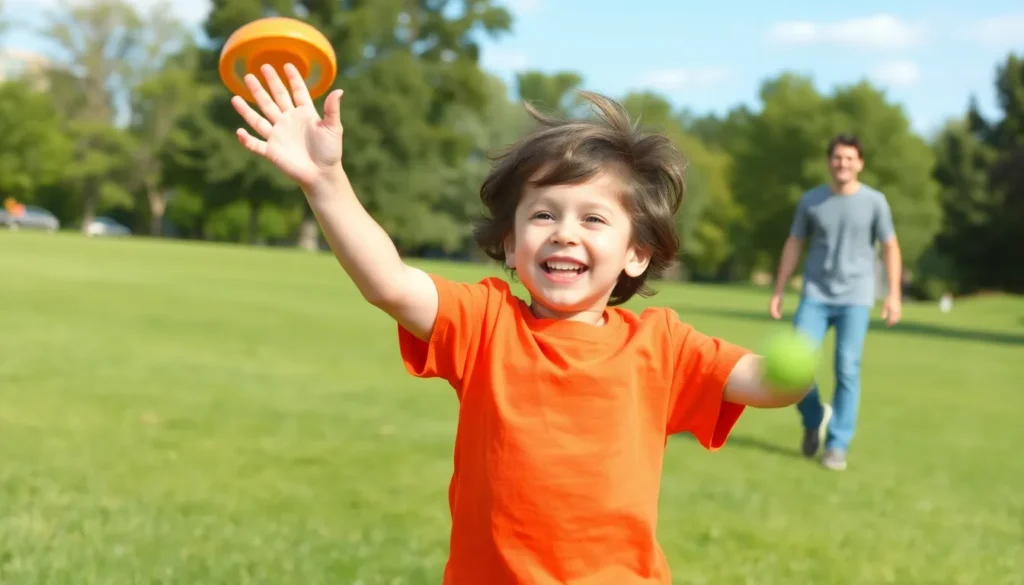Every parent dreams of raising a confident child who can tackle life’s challenges with a smile. But let’s face it, building confidence in kids isn’t as easy as teaching them to tie their shoes or eat their veggies. It’s more like trying to teach a cat to fetch—frustrating yet oddly rewarding when it works.
Table of Contents
ToggleUnderstanding Confidence
Confidence plays a vital role in a child’s growth. Developing a strong sense of self encourages kids to embrace challenges and pursue their goals.
Definition of Confidence
Confidence refers to a child’s belief in their abilities and judgment. It’s not just about feeling good; it encompasses self-assurance in taking risks and tackling new experiences. Kids with confidence trust their skills and decisions, which helps them navigate various situations. This belief strengthens their willingness to explore, learn, and engage in activities without fear of failure.
Importance of Confidence in Child Development
Confidence significantly influences a child’s overall development. High confidence fosters resilience, allowing children to bounce back from setbacks and try again. Social interactions often improve with confidence, as kids feel more comfortable engaging with peers. Furthermore, confident children tend to excel academically, showing higher motivation and focus in their studies. Prioritizing confidence in upbringing leads to well-rounded individuals capable of facing life’s challenges.
Factors Influencing Confidence in Kids

Confidence in kids stems from various influences, including genetic and environmental factors.
Genetic Factors
Genetics plays a crucial role in shaping confidence levels. Certain traits, such as temperament, can be inherited, affecting how children respond to challenges. Children with an innate tendency for optimism often exhibit higher self-confidence. Shyness, on the other hand, can also be a genetic factor, leading to increased anxiety in social situations. Research indicates that genetic predisposition influences personality traits that directly impact confidence. Understanding these genetic influences allows parents to tailor their support for their child’s development.
Environmental Factors
Environmental factors significantly affect children’s confidence levels. Supportive parenting creates a safe space for children to express themselves and take risks. Encouragement from parents enhances children’s belief in their capabilities. Schools that promote a positive learning environment contribute to building confidence through peer interactions. Extracurricular activities also play a key role by providing children opportunities to discover their strengths. Positive feedback and constructive criticism foster resilience, helping children to navigate challenges effectively.
Strategies for Building Confidence in Kids
Building confidence in kids involves several essential strategies that parents can implement daily.
Encouragement and Praise
Offering genuine encouragement significantly boosts a child’s self-esteem. Focus on specific efforts, not just outcomes, to reinforce positive behaviors. Recognizing small victories fosters a sense of achievement, helping kids feel valued. When parents celebrate successes, children internalize that their hard work matters. Verbal affirmations create a nurturing atmosphere, allowing them to develop a positive self-image. Consistent praise instills motivation, pushing them to tackle new challenges with enthusiasm.
Providing Opportunities for Success
Creating chances for success ensures children gain experience and competence. Parents can set age-appropriate tasks, allowing kids to experience achievement firsthand. Involvement in team sports, arts, or academic clubs encourages skill development. Exposure to varied activities helps kids discover their interests and strengths. Allowing autonomy in choices enables kids to build decision-making skills, reinforcing their sense of agency. Gradually increasing complexity in tasks prepares them for more significant challenges, driving continued growth in confidence.
Teaching Resilience
Instilling resilience equips kids to face setbacks confidently. Encouragement to view failures as learning opportunities fosters a growth mindset. Parents can share stories of overcoming difficulties, illustrating perseverance’s value. Discussions about problem-solving strategies promote critical thinking, enabling kids to navigate challenges effectively. Practicing coping techniques, like mindfulness or journaling, helps children cope with stress. Emphasizing that setbacks are part of growth encourages patience and determination, strengthening their ability to bounce back from adversity.
The Role of Parents and Educators
Parents and educators significantly influence a child’s confidence development. Their support is essential for fostering self-esteem and resilience.
Creating a Supportive Environment
Creating a nurturing and warm atmosphere is crucial. Children thrive in spaces where they feel secure expressing themselves. Encouragement from parents helps them take risks and explore new activities. Consistent praise for efforts, not just outcomes, boosts their belief in their abilities. A safe home allows kids to learn from mistakes without fear of harsh judgment. Enrichment activities outside the home also contribute to skill development and build confidence. Engaging with peers and adults in constructive ways reinforces a sense of belonging.
Effective Communication Techniques
Effective communication plays a pivotal role in forming self-assured children. Using positive language encourages open dialogue. Asking open-ended questions invites children to express thoughts and feelings. Active listening validates their experiences and fosters trust. Providing constructive feedback motivates children to improve without diminishing their self-worth. Being patient and giving them time to articulate their ideas enhances their confidence in sharing. Establishing a routine of regular discussions promotes ongoing communication, reinforcing their sense of security.
Building confidence in kids is a journey that requires patience and dedication. Parents and educators play a pivotal role in nurturing this essential trait. By fostering a supportive environment and encouraging children to take risks, they can help kids develop a strong sense of self-belief.
Implementing strategies like offering genuine praise and teaching resilience can significantly impact a child’s growth. As they learn to embrace challenges and view failures as opportunities, they become more equipped to navigate life’s ups and downs.
Ultimately, instilling confidence in children lays the foundation for their future success and well-being, empowering them to face the world with assurance and determination.



